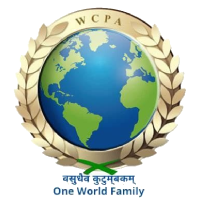WLA 48. Collegium Of World Judges Act.
Provisional World Parliament
27th through 31st December 2010, Rabindranath Tagore Auditorium, Bangla Academy, and Sri Aurobindo Bhavan, Calcutta, West Bengal, India
The Collegium of World Judges
Whereas planet Earth lacks the effective rule of enforceable democratically legislated law, and
Whereas a coherent, effective, and organized court system is essential to the rule of law, and
Whereas the present courts under the UN system lack essential features of effective courts such as the power of mandamus (the power to order arrests, subpoena witnesses, or compel testimony), and
Whereas the people of Earth are empowered, under Article 19 of the Constitution for the Federation of Earth, to create provisional world government in its multiple aspects such as world parliament, world enforcement, and world courts, and Whereas sections of the Earth Constitution germane to the present act read as follows: Article 19.6:
The World Parliament and the World Executive of the Provisional World Government shall proceed with the organization of other organs and agencies of the world government on a provisional basis, insofar as considered desirable and feasible, in particular those specified under Section 3.10 of Article 17.
Section 3.10 of Article 17 lists the first of these organs and agencies as “the World Supreme Court.”
Article 9.4.1 states that:
A Collegium of World Judges shall be established by the World Parliament. The Collegium shall consist of a minimum of twenty member judges, and may be expanded as needed but not to exceed sixty members. The article continues that “The Presiding Council of World Judges shall assign all world judges, including themselves, to the several benches of the World Supreme Court.
Therefore, we delegates sitting at the 12th session of the Provisional World Parliament do hereby activate a Collegium of World Judges as a component of the provisional world government.
- Retired supreme court judges from all countries may become members of a Collegium of World Judges under the authority of the Earth Constitution.
- The Collegium of World Judges is empowered to cooperate with the Provisional World Parliament to initiate and staff the World Supreme Court to function as part of Provisional World Government until such time as the Constitution for the Federation of Earth has been ratified by the people and nations of Earth and the final composition of the World Supreme Court takes place.
- The Collegium of World Judges and the World Supreme Court shall operate according to the Constitution for the Federation of Earth.
- Supreme court judges who are not retired may become part of the Advisory Board to the Collegium of World Judges. The Advisory Board shall organize itself independently and shall establish independent relations that are mutually agreed upon by the Collegium.
- The Collegium and Advisory Board shall deposit Minutes of meetings and records of activities for respective bodies with the Registrars designated below:
The World Constitution and Parliament Association (organizer of sessions of the Provisional World Parliament), in cooperation with the City Montessori School of Lucknow, India, (organizer of World Judiciary Summits), shall serve as joint Registrars for the Collegium of World Judges and for the Advisory Board for the Collegium of World Judges.
Those interested in serving as a member of the Collegium of World Judges under the authority of the Earth Constitution, should contact Mr. Sandeep Srivastava, Project Leader, International Conferences of Chief Justices of the World at CMS, Lucknow, article51~cmseducation.org (where ~ represents “@” to avoid auto-spam) or mobile: 91-9235394975) or Dr. Glen T. Martin, Secretary General, WCPA at gmartin~radford.edu , (where ~ represents “@” to avoid auto-spam)
Adopted 4:10 p.m., 27 December 2010, by the 12th Session of the Provisional World Parliament.
Attested,
Eugenia Almand, JD, Parliament Secretary

